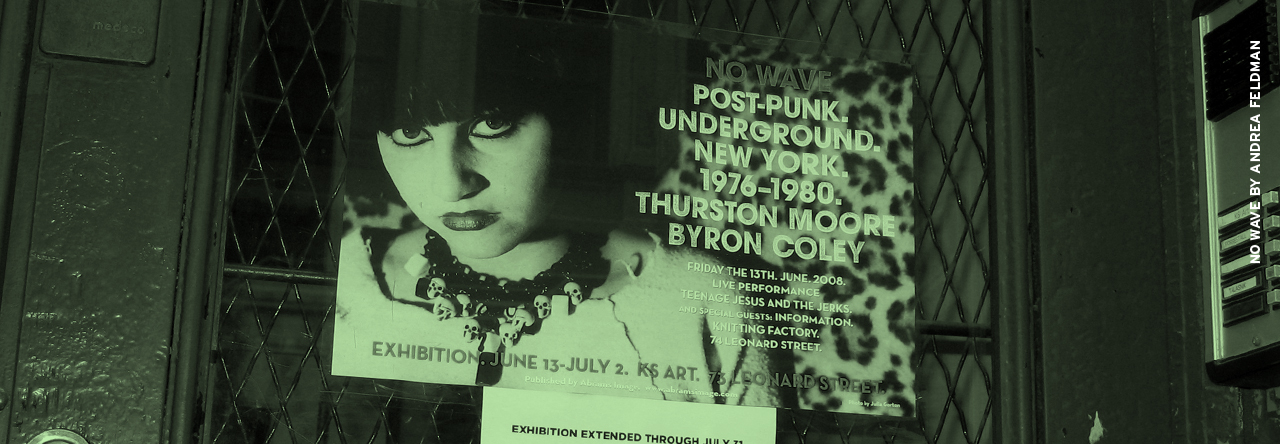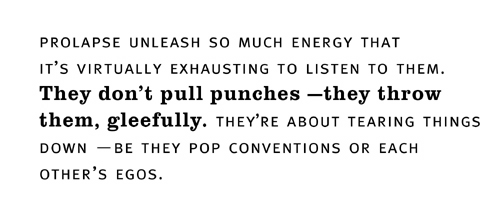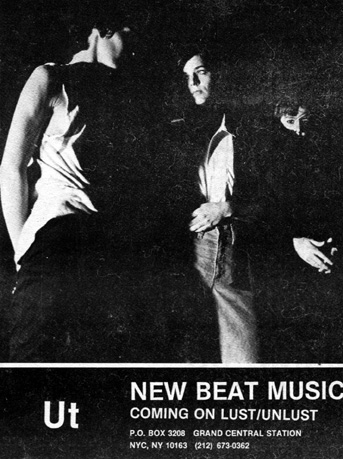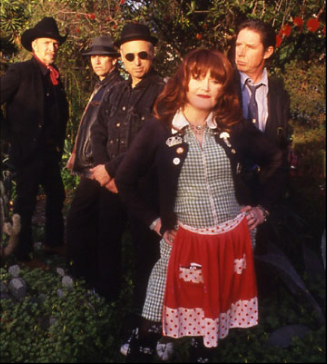Prolapse was a wonderful, unwieldy six-piece band of C86 misfits with a marked Fall obsession who managed to make four full-length albums, a million singles, and a whole hell of a lot of racket over the course of their anarchic eight-year existence. They made some of the spikiest, strangest, and Dadaistic pop music I’ve ever heard.
That’s right, I said pop music.
(Granted, to call them such you might have to squint a little. Bend the rules. C’mon, do it for me.)
Even at their most angular and thorny the band had a canny ear for crafting songs that had “anti-melody” scrawled all over them in biro but managed, against the odds, to become firmly wedged in your brain for days on end. Songs like “Pile Tent” and “Day at Death Seaside” had an undeniably propulsive drive and acid-drenched lyrics that proved the name of the band was hardly an idle threat.Pointless Walks to Dismal Places’ “Black Death Ambulance” adapted Sylvia Plath’s “Lady Lazarus” to elegiac effect —“My scars are your scars” —a line that summarizes just about every Prolapse song ever.
With Prolapse, there was never a dull moment. Not on record and certainly not in the live arena, where the dueling vocalists —the coolly remote Miss Steelyard and the hyper-kinetic Mister Derrick— would enact their own version of “Who’s Afraid of Virginia Woolf” while the band, deceptively workmanlike in demeanor and content to remain in the background, threw out volley after volley of guitar mayhem. As with most great bands, the effect was thrilling and disturbing at the same time. Prolapse earned their designation as a “violent Stereolab,” and their music —even when relatively smoothed out on later releases like The Italian Flag— never lost that core of dramatic, coiled sexual tension.
The following article was first published in the late, lamented Puncture in late 1996. I hope this reprint spurs at least one of you, dear readers, to seek out some of this band’s music. I promise you won’t regret it.
++++
Prolapse, “Lapse It Up”
[originally published in Puncture #37, late 1996]
An emotional blitzkrieg rages back and forth between Prolapse’s two vocalists —and it’s not just for show, as Andrea Feldman discovers. This Anglo-Scottish band is about tearing things down —pop conventions as well as each other’s egos— and then rebuilding them. [cont’d >>]
“You think you see my smiling —but I can see the sky’s caved in! I can see the sky’s caved in!” Prolapse vocalist Linda Steelyard sings this line like a threat —as though she’s the last sane person on earth. Or the last insane person…
Prolapse have taken he stage of their first-ever show in Boston. They’ve been whittled down to a mere five-piece (guitarist Dave Jeffreys has been called back to England to tend to his new baby). And so the task of whipping up Prolapse’s carefully constructed guitar chaos rests solely on Pat Marsden’s shoulders. Luckily, he’s more than up to the task. He’s aided and abetted by bassist “Geordie” Mick Harrison, who supplies rumbling, sinuous bass-lines. As drummer Tim Pattison unleases a volley of sharp, precise beats, perpetually dueling vocalists Linda and “Scottish” Mick Derrick take a moment to glare at one another. As they launch into a song just hours old, appropriately entitled “New One,” Mick quips, “Hello, we’re Galaxie 500.”
***
Those in attendance that night got the joke. Prolapse couldn’t be further from the elegant somnolence of Galaxie 500. While Galaxie buried tension under a smooth, icy surface, Prolapse have a maximalist aesthetic; Dean Wareham always sounded exhausted, but Prolapse unleash so much energy that it’s virtually exhausting to listen to them. They don’t pull punches —they throw them, gleefully.
Prolapse are about tearing things down —pop conventions, each other’s egos— then destroying and rebuilding them. Songs build and crumble at the same time, straddling the fine line between head-bobbing and head-banging with perfect aplomb. They’re the chaos to Stereolab’s harmony, if you will.
Prolapse’s influences and inspirations lean heavily towards the knotty and gnarled sounds of bands like Gang of Four, Au Pairs, Chameleons, Joy Division, and, of course, the Fall (Manchester must be Prolapse’s spiritual home, even though most of them hail from Leicester). Throw in some Red Krayola, Neu!, and Faust for good measure.
This beautifully clangy racket is topped off by the surreal, often mischievous vocal altercations betwixt Scottish Mick and Ms. Steelyard. Their personalities exemplify some generalizations one could make about Prolapse: she’s melody, he’s dissonance, she’s control, he’s chaos.
So —if listening to Prolapse’s 1994 debut Pointless Walks to Dismal Places is like getting caught in the middle of a knock-down, drag-out fight, not knowing whether to interfere or merely listen in, thenBacksaturday, its successor (Jetset), documents the point immediately after —where both parties sit there, seething with rage at one another. In a way, it’s more disturbing, because the tension is obviously there, roiling just below the surface.
Backsaturday was recorded in a day. Or maybe two. Scottish Mick spent most of the session down at the pub, only entering the studio to record the vocals, which are, in keeping with Prolapse tradition, largely improvised. Prolapse don’t believe in “practice makes perfect,” preferring instead to let inspiration (rather than “production values”) dictate their sound. Lest you think the dreaded word “improvisation” means some sort of wanky half-hour-long endurance test, rest assured that Prolapse are quite good at creating actual songs, thank you very much —from the slow, haunting “Zen Nun Deb” to the tralala single “TCR” (short for “Total Control Racing”) to the 15-minute, blistering rush of “Flex,” which features Mick’s most inspired vocal absurdities to date: “I will never pledge myself to be at one with fellow man…I will never conjugate the verb ‘to be’ when all else fails…I will always push the cart because some prick’s wandered off…I will never leave this life wi’ my mother’s disrespect.”
Prolapse formed at Leicester University, where the members were studying archaeology, physics, and literature, among other subjects. Linda takes up the narrative: “Apparently, they were sitting at a table at a disco, feeling really miserable and wanting to express this in music. They decided to form a miserable band and call it by a miserable name. So Prolapse was born.”
Scottish Mick elaborates: “We got drunk one night, went into a darkened room, and played a bunch of boyish guitar crap!
Linda goes on: “They played me the demo tape they’d made. It was people playing on bottles and tables. It was kind of crap, but there was something good in there, I could tell.”
Initially, Linda wasn’t in the band at all. As she explains it, “someone came up with the idea that my best friend, Angie, and I could stand at the side of the stage during Prolapse gigs and peel oranges, looking really mad. But when the gig happened, she never turned up. They said to me, ‘Why don’t you come anyway?’ And I did.”
Linda explains Prolapse’s idiosyncratic songwriting process: “Whatever anybody performs in the band, they’ve written themselves.” She adds, with a touch of wonder, “And at the end of the day, we’ve got songs!” I ask if it’s hard to keep that sort of momentum going. Wouldn’t it be easier having a dictator in a band, rather than six people going in opposite directions? “I think it would be hard for a lot of people,” she answers. “It’s different for us because we’ve always improvised. It’s not like we started with a songwriter. A band that starts with a songwriter can’t really progress into improvisation. But it’s easy for us, quite democratic.”
The band’s theatricality came naturally: both Linda and Mick have acted in local theater and on television, including Chez Lester, which Linda describes as a “weird, surreal soap opera,” in which she and Mick get to “show off and be different characters, and be a bit stupid!”
Early gigs had Linda pacing the stage and leafing through a bread bin filled with old issues of Melody Maker. Sundry items (potatoes, oranges, toy prams, televisions, etc.) ended up being broken or thrown. “That’s how we got our energy out onstage, but then, when the press started to notice it, they said things like, ‘See Prolapse, they throw things at the audience!’ So we had to stop doing it, because that was all people picked up on! That killed it for us!”
With no objects on stage to hurl at each other, Mick and Linda are content to give each other significant stares. Live, Mick’s whirlwing-dervish persona is thrown into stark relief compared to Linda’s quiet intensity. He’s hyperkinetic, rail-thin and a bit scruffy in thrift-store polyester shirt and bone-bag jeans, stalking around the stage looking menacing.
Between songs, Mick adds droll commentary to the proceedings: “Now that was from the shambolic to the ridiculous,” he comments after a slightly ramshackle version of Pointless Walk’s “Headless in a Beat Hotel.” “Is there any more beer? We’re dyin’ up here!” Someone complies with a pitcher. Mick takes a swig, then quips: “I love American beer! It tastes like water. If you ever get drunk on American beer …feel a bit embarrassed!” When Linda mentions that the next song is one they just made up for a radio session that afternoon, and that it could go “horribly wrong,” Mick adds: “If it goes horribly wrong you’ll know not to listen to the radio tomorrow!”
So they have a talent for self-deprecation.
***
I have to repress the urge to put the opening strains of Pointless Walks’ “Tina This is Matthew Stone” on my answering machine. I gleefully imagine that the sound of Linda screaming, “Why don’t you shut your mouth until you think of something good to say?” will strike fear into the hearts of telemarketers everywhere.
“Tina” documents a violent, crockery-smashing battle between Mick and Linda. At first, she seems to be winning: her impish ability to cut through his bluster with a well-aimed barb seems to anger him into near-silence. “What? Cat got yer tongue?” she taunts. “If you tried speaking with your brain instead of your bloody arsehole we might get somewhere!” “Oh, I hav’na heard that one before!” he bellows. “Can we talk about somethin’ else instead o’ somethin’ we always talk about?” “I can’t believe the shit that comes out of your mouth!” she retorts. “I want to kill you!” It ends with the sound of blows being exchanged —“don’t you ever hit me wi’ anything ever again!” Mick screams, as Linda retreats, sobbing.
During the recording of the song, producer Steve Mack had to leave the studio. “He thought it was a real fight!” recalls Mick. “We managed to knock over some equipment in the studio. We were throwin’ each other about! At the end it sounds like Linda crying, but she’s actually laughing ‘cause it’s so ridiculous!”
Linda remembers it somewhat differently: “I can’t bear to listen to that song. Can’t listen to it at all. That’s why it’s annoying when people say, ‘Did you choreograph that?’ That’s not what it’s about at all!”
The unflinching intimacy of songs like “Tina” and Backsaturday’s “Flex” is one of the most compelling (and disconcerting) things about Prolapse. At times Linda seems exasperated by her partner’s never-ending bluster: “What are you wearin’ those glasses for, you slimy git? What are you trying to hide?” she growls on “Every Night I’m Mentally Crucified (7000 Times),” her voice almost drowned out by the unrelenting percussion. Her composure is the perfect foil to Mick’s disjointed harangues. She and Mick know how to play off of one another. Linda remarks: “Most people in bands don’t know each other so well. They wouldn’t dream of going near each other, which is why most people just stand there and get on with it. Mick and I went out together. We know each other well, we can throw each other around.”
***
![]() Prolapse, “Black Death Ambulance” [right-click-save-as, s’il vous plaît]
Prolapse, “Black Death Ambulance” [right-click-save-as, s’il vous plaît]
For more information on Prolapse please visit Graham’s most excellent Prolapse pages. Or, you can always add your 2¢ over at Wikipedia or the ever-entertaining Prolapse: Classic or Dud?


![Prolapse-[RT]](http://warpedrealitymagazine.com/wp-content/uploads/2015/09/prolapse-rt.jpg)


